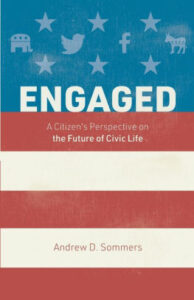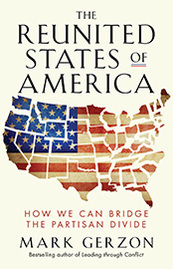 Exciting news! There’s a wonderful new resource that was recently published that we encourage those in our network to utilize, especially those working in higher education, called Creating Space for Democracy: A Primer on Dialogue and Deliberation in Higher Education. The book is edited by Nicholas V. Longo and Timothy Shaffer, with many chapter authors from the NCDD network.
Exciting news! There’s a wonderful new resource that was recently published that we encourage those in our network to utilize, especially those working in higher education, called Creating Space for Democracy: A Primer on Dialogue and Deliberation in Higher Education. The book is edited by Nicholas V. Longo and Timothy Shaffer, with many chapter authors from the NCDD network.
From the book’s brief: “This primer offers a blueprint for achieving the civic mission of higher education by incorporating dialogue and deliberation into learning at colleges and universities.” You can receive 20% off the book when you use the code, “DEM20” at checkout and Amazon has the first chapter available for free. Below is more about the book and the Table of Contents so you can get a sense of the book – read more here.
For the Next Generation of Democratic Citizens
We live in divisive and polarizing times, often remaining in comfortable social bubbles and experiencing few genuine interactions with people who are different or with whom we disagree. For our democracy to thrive at a time when we face wicked problems that involve tough trade-offs, it is vital that all citizens participate fully in the process. We need to learn to listen, think, and act with others to solve public problems. This collaborative task begins with creating space for democracy. This book provides a guide for doing so on campus through deliberation and dialogue.
At the most basic level, this book describes collaborative and relational work to engage with others and co-create meaning. Specifically, dialogue and deliberation are processes in which a diverse group of people moves toward making a collective decision on a difficult public issue.
This primer offers a blueprint for achieving the civic mission of higher education by incorporating dialogue and deliberation into learning at colleges and universities.
This book, intended for all educators who are concerned about democracy, imparts the power and impact of public talk, offers the insights and experiences of leading practitioners, and provides the grounding to adopt or adapt the models in their own settings to create educative spaces and experiences that are humanizing, authentic, and productive. It is an important resource for campus leaders, student affairs practitioners, librarians, and centers of institutional diversity, community engagement, teaching excellence and service-learning, as well as faculty, particularly those in the fields of communication studies, education, and political science.
Table of Contents:
Introducation: Dialogue and Deliberation in Higher Education—Nicholas V. Longo and Timothy J. Shaffer
1) Discussing Democracy: Learning to Talk Together—Nicholas V. Longo and Timothy J. Shaffer
Part One: Concepts and Theories
2) Readiness for Discussing Democracy in Supercharged Political Times—Nancy Thomas
3) Deliberative Civic Engagement: Toward a Public Politics in Higher Education—Derek W.M. Barker
4) Cultivating Dialogue and Deliberation Through Speech, Silence, and Synthesis—Sara A. Mehltretter Drury
Part Two: Methods of Dialogue and Deliberation
5) Creating Cultures of Dialogue in Higher Education: Stories and Lessons from Essential Partners—John Sarrouf and Katie Hyten
6) Building Capacity in Communities: Everyday Democracy’s Dialogue to Change Approach—Martha L. McCoy and Sandy Heierbacher
7) Sustained Dialogue Campus Network—Elizabeth Wuerz, Rhonda Fitzgerald, Michaela Grenier, and Ottavia Lezzi
8) Educational Justice Using Intergroup Dialogue—Stephanie Hicks and Hamida Bhagirathy
9) The Free Southern Theater’s Story Circle Process—Lizzy Cooper Davis
10) The National Issues Forums: “Choicework” as an Indispensable Civic Skill—Jean Johnson and Keith Melville
11) What IF The Interactivity Foundation and Student-Facilitated Discussion Teams—Jeff Prudhomme and Shannon Wheatley Hartman
Part Three: Dialogue and Deliberation in the Curriculum
12) The Student as Local Deliberative Catalyst: The CSU Center for Public Deliberation—Martín Carcasson
13) Dialogue as a Teaching Tool for Democratizing Higher Education: The Simon Fraser University Semester in Dialogue—Janet Moore and Mark L. Winston
14) Conversations that Matter—Spoma Jovanovic
15) Talking Democracy—David Hoffman and Romy Hübler
Part Four: Dialogue and Deliberation Using Campus Spaces
16) Democracy Plaza at IUPUI—Amanda L. Bonilla and Lorrie A. Brown
17) Academic Libraries as Civic Agents—Nancy Kranich
18) Residence Halls as Sites of Democratic Practice—Laurel B. Kennedy
Part Five: Dialogue and Deliberation in the Community
19) Providence College/Smith Hill Annex—Keith Morton and Leslie Hernandez
20) Lessons from the Front Porch: Fostering Strengthened Community Partnerships Through Dialogue—Suchitra V. Gururaj and Virginia A. Cumberbatch
21) Local Participation and Lived Experience: Dialogue and Deliberation Through Participatory Processes in Landscape Architecture—Katie Kingery-Page
22) “Give Light and the People will Find a Way:” Democratic Deliberation and Public Achievement at Colorado College—Anthony C. Siracusa and Nan Elpers
Part Six: Dialogue and Deliberation Networks
23) New Hampshire Listens: Fulfilling the Land-Grant Mission While Strengthening Democratic Practice—Bruce L. Mallory, Michele Holt-Shannon, and Quixada Moore-Vissing
24) Start Talking, Stop Talking, and Toxic Talking: Resources for Engaging Difficult Dialogues in Higher Education—Libby Roderick
25) Enacting Democracy In “Democracy’s Colleges”—Carrie B. Kisker, John J. Theis, and Alberto Olivas
Conclusion: Sources of Democratic Professionalism in the University—Albert Dzur
You can learn more about the new book, Creating Space for Democracy: A primer on Dialogue and Deliberation in Higher Education, on the publisher’s site here.


 By Andrew D. Sommers
By Andrew D. Sommers Beyond Civility: The Competing Obligations of Citizenship
Beyond Civility: The Competing Obligations of Citizenship

 Concerned citizens across the globe fear that democratic institutions are failing them. Citizens feel shut out of politics and worry that politicians are no longer responsive to their interests. In Hope for Democracy, John Gastil and Katherine R. Knobloch introduce new tools for tamping down hyper-partisanship and placing citizens at the heart of the democratic process. They showcase the Citizens’ Initiative Review, which convenes a demographically-balanced random sample of citizens to study statewide ballot measures. Citizen panelists interrogate advocates, opponents, and experts, then write an analysis that distills their findings for voters. Gastil and Knobloch reveal how this process has helped voters better understand the policy issues placed on their ballots. Placed in the larger context of deliberative democratic reforms, Hope for Democracy shows how citizens and public officials can work together to bring more rationality and empathy into modern politics.
Concerned citizens across the globe fear that democratic institutions are failing them. Citizens feel shut out of politics and worry that politicians are no longer responsive to their interests. In Hope for Democracy, John Gastil and Katherine R. Knobloch introduce new tools for tamping down hyper-partisanship and placing citizens at the heart of the democratic process. They showcase the Citizens’ Initiative Review, which convenes a demographically-balanced random sample of citizens to study statewide ballot measures. Citizen panelists interrogate advocates, opponents, and experts, then write an analysis that distills their findings for voters. Gastil and Knobloch reveal how this process has helped voters better understand the policy issues placed on their ballots. Placed in the larger context of deliberative democratic reforms, Hope for Democracy shows how citizens and public officials can work together to bring more rationality and empathy into modern politics.

 Many of us are frustrated by the divisive nature of our public discourse, mistrust and broken promises. We lack hope that we can bridge our divides, come together and get things done.
Many of us are frustrated by the divisive nature of our public discourse, mistrust and broken promises. We lack hope that we can bridge our divides, come together and get things done.
